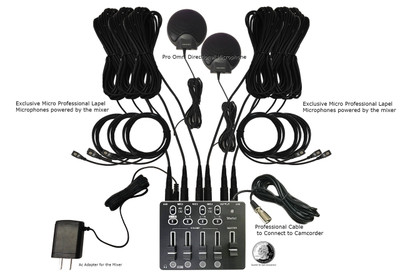The Value of Lawful Video Depositions in Modern Legal Solutions: What You Ought to Know
Legal video depositions have actually come to be important in today's lawful landscape. They give a multidimensional view of witness testaments that conventional records simply can not match. By capturing both verbal and non-verbal communication, these depositions boost the total understanding of a witness's trustworthiness. Nevertheless, the performance of video depositions hinges on numerous aspects, including conformity with legal requirements and ideal techniques (legal video depositions). Checking out these elements discloses their true value in modern lawful services
What Are Legal Video Clip Depositions?
Lawful video depositions work as an important device in the lawsuits process. They involve taping witness statements in a video clip style, recording both verbal and non-verbal communication. This method permits lawyers to document the disposition, expressions, and reactions of witnesses, offering a richer context for the testament. Commonly conducted in a regulated environment, these depositions are led by attorneys that ask concerns while a court reporter documents the discussion. The resulting video clip can be vital for test preparation, as it makes it possible for legal representatives to assess the integrity of witnesses and fine-tune their methods. Furthermore, lawful video clip depositions can be used in various legal contexts, varying from civil disputes to criminal instances. The acoustic and aesthetic components of video depositions boost the presentation of proof, making it a crucial component in the modern-day legal landscape. In general, they contribute considerably to the performance and efficiency of lawful process.

Advantages of Video Depositions Over Conventional Methods
Video clip depositions provide various advantages contrasted to typical methods of taking witness statements. One substantial advantage is the capacity to catch both visual and audio aspects, offering a much more comprehensive record of the witness's declarations. This twin format enhances clearness and enables lawyers to reference certain nuances throughout test preparation. Additionally, video clip depositions help with remote engagement, making it much easier for witnesses who may be not available for in-person looks because of geographical restrictions or health issues.Moreover, video clip depositions can quicken the general deposition process, lowering the moment and prices connected with traveling and logistics. They additionally boost access, as videotaped depositions can be easily shared among lawful groups and referenced any time. This benefit contributes to much better instance administration and prep work. Generally, video clip depositions represent a modern-day, reliable method to gathering witness statements, lining up with the progressing needs of the legal career.
The Duty of Body Movement and Tone in Testimonies

In legal video clip depositions, body movement and tone play important roles in conveying a witness's reputation and reliability. Nonverbal cues can give understandings into a witness's mood, influencing how their statement is perceived. Comprehending the impact of these aspects is crucial for lawyers and jurors alike when evaluating the dependability of a testimony.
Nonverbal Communication Insights
While spoken communication is typically stressed in lawful testimonies, nonverbal signs such as body movement and tone play an essential role in conveying trustworthiness and emotion. Onlookers of depositions may note that a witness's stance, motions, and facial expressions can greatly influence assumptions of dependability. Consistent eye get in touch with may signify self-confidence, while avoiding look could recommend deceit or pain. The tone of voice-- its quantity, pitch, and speed-- can present feelings of genuineness or uncertainty. Lawyers need to be attuned to these nonverbal signals, as they frequently give important context that enhances talked words. Recognizing these nuances can enhance the performance of depositions and affect the result of legal process.
Psychological Tone Effect
The emotional tone communicated during legal testimonies significantly influences just how a witness is regarded. Body movement, singing inflections, and faces play crucial duties fit the story of a statement. A witness displaying confidence via constant eye get in touch with and a calm tone can infuse a sense of dependability and involvement. Alternatively, indicators of anxiety, such as fidgeting or an unsteady voice, may lead to suspicion regarding their account. The nuances of psychological expression can affect the analysis of realities, making it crucial for lawyers to identify these hints. In video clip depositions, the visual and auditory elements incorporate, stressing the value of emotional tone in communicating sincerity and reliability within the legal process.
Integrity and Credibility
An important consider developing reputation and trustworthiness throughout testaments depends on the witness's body movement and tone of voice. Observers usually count on non-verbal hints-- such as eye get in touch with, position, and motions-- to examine a witness's genuineness. For instance, a witness that keeps eye call and presents open body language may be regarded as more reputable and honest than one who stays clear of eye contact or appears closed off. Additionally, tone of voice plays an essential duty; a constant, tranquil tone can enhance the reputation of the testimony, while changes in pitch or volume may raise questions. Eventually, the combination of body language and vocal tone considerably affects just how a witness's declarations are gotten and analyzed in a legal context.
Finest Practices for Carrying Out Video Depositions
Performing video depositions needs mindful planning and implementation to ensure a clear and effective presentation of statement. It is crucial to select a peaceful, well-lit location to lessen disturbances and secure ideal video clip top quality. The devices should be tested in breakthrough, including electronic cameras, microphones, and lighting, to stay clear of technological problems during the deposition.Next, celebrations redirected here involved should review the format and treatments ahead of time, making certain that every person recognizes their roles. The deponent should be informed on the procedure, including exactly how to react clearly and concisely.Additionally, keeping an expert disposition throughout the session is necessary. This includes abstaining from speaking over each other and validating that all concerns are directed properly. Lastly, it is crucial to record the deposition in a layout that allows for very easy playback and review, protecting the stability of the testimony for future use.
Lawful Considerations and Conformity Issues
Exactly how do lawful considerations and conformity problems influence the effectiveness of video clip depositions? Lawyers should browse an intricate landscape of guidelines, ensuring that video depositions adhere to administrative rules and standards. Conformity with laws worrying personal privacy, authorization, and taping approaches is vital. For straight from the source example, getting explicit permission from all parties entailed is necessary to avoid lawful repercussions.Additionally, the admissibility of video clip evidence in court can pivot on conformity with procedural needs. Ensuring that the equipment used fulfills technical criteria is likewise vital, as low quality can undermine the deposition's reliability.Moreover, lawyers must understand any type of particular state regulations that regulate video depositions, as these can differ considerably. Failing to resolve these considerations can not only jeopardize the integrity of the deposition yet also impact the total instance approach, eventually influencing the client's lawful results.
How Video Depositions Impact Jury Assumption
While video depositions can function as effective devices in legal procedures, their impact on court assumption is substantial. The acoustic and aesthetic elements of video clip recordings supply jurors with a more complete understanding of witness attitude, reputation, and emotional feedbacks. This multimedia technique can improve the jurors' capacity to evaluate the dependability of statement compared to conventional text-based transcripts.Moreover, video clip depositions enable jurors to observe body language, intonation, and face expressions, all of which can impact their interpretation of the witness's statements. The presence of a witness on screen can humanize them, cultivating empathy and link, which may persuade jurors' opinions. Conversely, a witness that shows up incredibly elusive or untrustworthy on video might cause adverse assumptions that affect a jury's decision. Ultimately, the dynamic nature of video depositions plays a vital duty in forming exactly how jurors interpret evidence and reach their decisions.
The Future of Video Clip Depositions in Legal Technique
As improvements in innovation proceed to improve the legal landscape, the future of video clip depositions is positioned for considerable development. Innovations such as fabricated knowledge, virtual reality, and improved video clip conferencing tools are expected to simplify the deposition procedure and improve availability. Attorneys may use AI-driven analytics to examine witness trustworthiness and case toughness much more effectively.Moreover, the combination of digital truth could allow juries to experience immersive simulations of depositions, supplying much deeper context and understanding. In addition, the trend toward remote depositions is likely to linger, offering better flexibility for attorneys and clients alike.As remote work ends up being significantly stabilized, video clip depositions will likely become common method, lowering prices and time restrictions connected with typical methods. On the whole, these technical advancements promise to improve the performance, effectiveness, and availability of video depositions in lawful practice, inevitably transforming just how lawyers plan for trial.
Frequently Asked Questions
Just How Much Do Legal Video Clip Depositions Usually Cost?

Can Video Depositions Be Made Use Of in Any Kind Of Sort Of Instance?
Video depositions can be made use of in different types of situations, including civil, criminal, and family law. Their adaptability allows attorneys to present witness testimonies effectively, adapting to the particular needs of different legal situations.
What Equipment Is Required for a Video Deposition?
To carry out a video deposition, important tools consists of a top quality electronic camera, microphone, lighting, and a reputable recording tool. Additionally, a computer with editing and enhancing software may be needed for post-production and formatting the last video.
How Lengthy Does a Typical Video Deposition Last?
A normal video deposition lasts between two to 4 hours, depending upon the intricacy of the situation and the variety of inquiries positioned. Prolonged sessions might occur, however breaks are normally incorporated for individual convenience.

Are Video Depositions Admissible in Court?
Video clip depositions are normally permissible in court, offered they follow lawful standards and guidelines of evidence. Their use enhances quality and preserves witness statement, aiding in the judicial procedure during hearings and trials. Legal video clip depositions have actually ended up being important in today's legal landscape. Additionally, lawful video clip depositions can be used in numerous lawful contexts, varying from civil disputes to criminal cases. Furthermore, video depositions promote remote engagement, making it easier for witnesses who may be unavailable for in-person looks due to geographical constraints or health and wellness issues.Moreover, video depositions can expedite the total deposition procedure, minimizing the time and expenses connected with travel and logistics. Making sure that the tools made use of satisfies technological standards is additionally crucial, as bad high quality can undermine the deposition's reliability.Moreover, lawyers must be aware of any kind of details state regulations that control video depositions, as these can vary considerably. Additionally, the pattern toward remote depositions is most likely to persist, supplying better versatility for clients and lawyers alike.As additional hints remote job becomes increasingly normalized, video depositions will likely end up being basic practice, minimizing expenses and time restraints linked with typical methods.